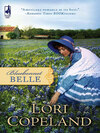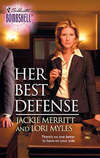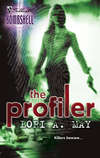Kitabı oku: «Bluebonnet Belle», sayfa 3
April’s slim, delicate frame and light features were a stark contrast to Beulah’s dark features and five-foot, two-hundred-pound frame. Beulah had inherited her father’s stockiness, and April knew it had long ago ceased to concern her. She was happy with her lot, eating cinnamon rolls without apology, while April was still trying to find her purpose in life.
“So, how’s the job?” her friend repeated.
“I wasn’t sure at first how I was going to like it, but I do. I feel I’m doing something important, and I like that.”
“Your grandpa find out what you’re up to yet?”
April shrugged. “No. You know he wouldn’t understand.”
“Your mother was his daughter. He knows she didn’t have to die.”
“I’ll grant you that if men had the same problems as women, there’d be no unnecessary surgeries without some very serious deliberation.”
“Oh, hogwash! You’re getting radical.”
Beulah got up and dusted a shelf of medical supplies as they talked. “I do think you ought to tell your grandpa you’re selling Mrs. Pinkham’s compound. If he finds out what you’re doing—”
Not wanting to hear any more about the subject, April abruptly switched topics. “I’m not going to the Founders Hall event.”
Glancing up, Beulah frowned. “You’re not?”
“No, Henry has to go to Austin on business.”
“Oh.” Her friend’s face fell. “And you bought that lovely blue dress.”
“I know, but I can use it another time. Henry’s work comes first.”
Resuming her dusting, Beulah muttered, “Rather thoughtless of him to plan a business trip at this time.”
“It couldn’t be helped, Beulah.”
“Mmm, maybe.”
“Are you going to the dance?” April asked.
“Of course.”
“Wonderful. With anyone I know?”
“Papa. Mother is still away tending to Aunt Mary.”
“Oh.”
“Don’t sound so disappointed. You know no man is going to ask me to a dance.”
“Beulah Ludwig, you stop that!” Crossing the room, April gently took her by the shoulders and shook her. “Don’t ever say that again in my presence. If the men in this town are so blind they can’t see anything but a woman’s dress size, then I say shame on them! Their loss!”
“Dash it all, I don’t care,” Beulah said as the two hugged each other. “My life is full. I don’t need any man to boss me around. Not one like Henry, that’s for sure.”
“I know you don’t like Henry, but you don’t know him like I do,” April whispered.
“I’ve known him as long as you have.”
“He’s so…charming, attentive,” April argued. “Do you know what he calls me?”
“Slave?”
“No, be serious.”
Eyeing her warily, Beulah said, “What?”
“Bluebonnet belle. Isn’t that just the sweetest thing you’ve ever heard!”
“Simply ducky.”
Just then the bell over the door rang, and aged, nearly deaf Mrs. Faith hobbled in.
“Good day to you, Mrs. Faith.” Beulah greeted the elderly lady loudly. “What can I do for you?”
“Eh?”
“What can I do for you?”
Mrs. Faith leaned on her cane and waved a piece of paper. “Got this prescription, Porky. That young doctor gave it to me and told me to bring it over here and give it to you.”
“Let me see what you have,” Beulah said, reading the prescription. “Yes, we can fill this for you.”
“Eh?”
“We have this!” Beulah shouted toward her less-deaf ear.
“You sure? I wouldn’t want to get the wrong thing. Doctor says it would help my gout.”
“I’m sure it will. It’ll only take a minute.”
“Well, hurry up. It’s been paining me something awful lately.”
April motioned to Beulah, who excused herself from her customer, saying she’d be right back.
“Give her some of Mrs. Pinkham’s Vegetable Compound.”
“What?” Beulah demanded in a hushed whisper.
“Give Mrs. Faith some of the compound.”
“Are you out of your mind? She’s got the gout, not the monthlies!” Glancing at her customer, Beulah smiled. “Just take a minute, Mrs. Faith!”
“Eh?”
“Some of the compound, Beulah. Pour some in a bottle and tell her to use it in addition to the prescribed medicine.”
“Never. The compound is not going to help her gout, and Papa would have a fit. Do you know the consequences of dispensing medicine without the proper authority?”
“It isn’t medicine. It’s just an herbal compound. But it will really perk her up. You’ll see.”
It was the perfect answer. April had been trying to think of a way to boost sales and get the word out about the compound, and the solution was right under her nose!
“The compound is for female problems,” Beulah argued in a quiet tone, glancing at Mrs. Faith again.
“Oh, come on, do the woman a good deed and give her some of the compound.”
When Mrs. Faith glowered toward them again, Beulah waved. “Be right with you, ma’am.”
“You do have some, don’t you? You didn’t pour it out?” April had brought her friend a sizable jugful a few weeks ago, thinking she might use it.
“I have it,” Beulah snapped. “I intended to throw it away, but Papa’s always around when I think of it.”
“Then do it.” April took her arm, urging her toward the back room. Mrs. Faith looked up again, glowering.
April and Beulah waved, grinning.
“I can’t tamper with Papa’s prescriptions,” Beulah whispered.
April made sure she kept smiling as she led her friend to the back room. “What tampering? There’s nothing in the compound to hurt her. I want to see if it really does what Lydia says it will.”
“I can’t.”
“Come on, come on, please. I need to know how good this tonic really is.”
It would make her decision to help Lydia Pinkham in her endeavor to improve women’s health so much easier if she knew for certain the compound worked. Not to mention make her feel less guilty about keeping her activities from Grandpa.
“Then take it yourself.”
“I don’t have any problems—except the wicked monthlies.”
“Mrs. Faith doesn’t even have the wicked monthlies. She’s got the gout!”
“And female problems, I bet. She has to. She’s old as dirt. At least offer her some, and see if she agrees to take it.”
Dragging a chair to the shelf, Beulah climbed up on it, balancing her bulk as she reached for a gallon jug well hidden behind a row of bottles. “If Papa ever gets wind of this he’ll take a belt to me.”
“Just tell him the truth. In addition to filling Mrs. Faith’s prescription, you suggested a mild tonic that one of your customers makes and uses herself.” April helped lower the gallon jug. “That isn’t a lie.”
“Well…we do sell and ship a lot of nettle tea to Mrs. Pinkham.”
Reaching for a funnel, Beulah poured some of the compound into a small brown medicine bottle. “See what you’re making me do?”
“You’ll be glad you did it when you see how perky Mrs. Faith becomes.”
When the bottle was full, Beulah stuck a cork in it and hurriedly shoved the jug of compound back on the shelf.
The two young women emerged from the back room, smiling. “I’ll fill your prescription now, Mrs. Faith.”
April browsed the small pharmacy, keeping an eye on her friend as she attended her duties.
“Here you are, Mrs. Faith,” Beulah said a few moments later, as she came down the steps carrying the medicine.
“Humph. High time,” Mrs. Faith grumbled. She dug in her purse for a coin. “How much, Porky?”
“Twenty-five cents.”
“Twenty-five cents! Where’s your gun? Does that young whippersnapper doctor think I’m made out of money?”
“Papa’s working hard to get the prices down.”
“Does he believe money grows on trees?”
“I don’t think so.”
Handing her the coins, Mrs. Faith turned to leave.
Shooting a warning look, April motioned to the bottle of compound Beulah was still holding. Her friend’s face screwed into a stubborn mask.
April held her gaze, daring her to back down.
“Oh, Mrs. Faith?”
The old woman paused in the doorway. “What is it?”
Clearing her throat, Beulah grinned. “Would you like to try some tonic?”
She frowned. “Some what?”
“Some tonic. It will give you get up and go.”
The old woman glared indignantly. “Are you saying I don’t have get up and go?”
“No, of course not. You’re in fine shape…for your age…”
Mrs. Faith’s frown turned menacing.
April quickly stepped in. “Oh, you mean that wonderful tonic everyone is talking about? Do you have some?”
Beulah nodded halfheartedly. April could see she wasn’t in the spirit of the sale.
“Well, I’d love to try some. Wouldn’t you, Mrs. Faith?”
“Don’t need it.” She started out the door again.
“Wait!” April hurried over to take the bottle out of Beulah’s grasp. Handing it to Mrs. Faith, she smiled. “Just take a couple of spoonfuls a day for the next week and see if you can tell any difference in how you feel.”
“I feel fine.”
“I know, but you’ll feel even better.” April confidently tucked the bottle into the small basket the woman habitually carried on her left arm.
Mrs. Faith studied the bottle. “Don’t think I’m going to pay for it.”
“Certainly not—you wouldn’t think of charging her for it, would you, Beulah?”
Shaking her head, Beulah busied herself dusting the foot powders.
“Well, guess it can’t hurt.” The old woman eyed the two girls sternly. “Porky Ludwig, does your papa know you lollygag around, whispering and giggling, when he’s not here?”
“Yes, ma’am, he does, and he’s warned me about it,” Beulah assured her. April held the front door open as the woman hobbled out.
When the door closed, Beulah flew into her. “I hope you know what you’re doing, April Truitt!”
April laughed. “She’ll be swinging from the rafters this time next week.”
Returning to her dusting, Beulah fretted. “Dr. Fuller will tell Papa if he finds out I gave her Lydia Pinkham’s compound.
“He won’t know it’s Lydia’s compound.”
“Dr. Fuller caters to Mrs. Faith, you know. Tells her she’s beautiful. She laps it up—but then, most of the unmarried women in town and half the married women suddenly have a ‘problem’ now. Have you noticed?”
“That he’s single?”
“That he’s handsome, silly.”
“I’ve noticed.” April brushed an imaginary speck of dust off the counter.
“Now, there’s a man I’d like to kidnap.”
“Well, he is nice-looking, but he isn’t my type.”
“Meaning he doesn’t agree with your opinion of Mrs. Pinkham’s compound?”
“You should have seen him at the rally the other day. I don’t know why he was there. Standing there in the midst of all those women, arms crossed, looking as if he couldn’t believe what he was hearing. Spoke right up about how females should trust doctors. Nearly started a riot. He saw me, and if looks could kill, I’d be lying in Grandpa’s front parlor right now.”
“Golly.” Beulah’s eyes widened. “Does he know who you are?”
“No. He visits on the porch with Grandpa occasionally, but it’s dark and I keep well-hidden. He hasn’t seen me, I’m almost certain, or he would have told Grandpa about the compound. He’s a snitch.”
“How do you know?”
April shrugged. “He’s too good-looking to be honorable.”
“Well, if the compound’s everything Mrs. Pinkham claims it is, the good doctor would be out of business in a week.”
April snorted. “I don’t think he’s threatened either by the compound or by me.”
Beulah paused, her dust cloth suspended in midair. “You didn’t make a scene.”
“No…well, sort of. I fell over my table of elixir.”
“Accidentally?”
“No, on purpose. The crowd was out of control, coming at me. I backed up, fell over the table, cracked my head, then pretended to be unconscious.”
“And it worked?”
She blushed, recalling how Gray Fuller had seen right through her little ruse. Undoubtedly he had had a good laugh at her expense.
“You should have seen me. It was humiliating. The table collapsed, making a horrendous scene. I would’ve been smarter to let the crowd trample me.”
Beulah laughed. “And Dr. Fuller saw you?”
“Saw me? He rushed over to help. Naturally, I pretended to faint, but he knew what I was doing.”
Her friend’s hand flew to her mouth. “He knew?”
“Without a doubt, but he went along with me. Actually, he was rather charming about the whole thing.”
April knew his kind. All charm, certain his diploma gave him all kinds of rights—including meddling, if he could.
“I don’t know, April. Eventually he’ll know who you are. Maybe you should go to him and explain about your grandpa’s heart, and why you don’t want him to know you’re working with Lydia.”
“No. It’s none of Dr. Fuller’s business.”
“After your mother’s unfortunate death, your grandpa might understand why you’re working to help save other women from the same fate,” Beulah mused.
“Grandpa refuses to talk about Mama.”
The loss of his only daughter during a routine hysterectomy seven years earlier had traumatized him. Riley had never fully recovered. When Delane’s name was mentioned, he refused to discuss her.
“Any man who takes in a fourteen-year-old girl to raise—a pigheaded fourteen-year-old, I might add—can’t be as close-minded as you paint him to be.”
Sighing, April went to look out the pharmacy window. “I saw Mama die. And she didn’t need to. If that doctor had known more, if he’d had something like Lydia’s vegetable compound to at least try before surgery, my mother might still be alive. That’s why I do what I do—not to torment Grandpa, but in the hope that someone else won’t lose their mother or daughter to needless medical procedures.”
“Then why wouldn’t your grandpa encourage you to sell a product intended to help women?”
“He thinks the compound is nonsense, and it wouldn’t help anyone.”
“He told you this?”
“He doesn’t have to. I’ve heard him talking. He thinks women are silly for taking it.”
“Still, I think you should tell Riley what you’re doing.”
“You’re entitled to your opinion. Just make sure you don’t let it slip when Grandpa comes in to buy sundries.”
“Don’t worry about me,” Beulah told her as April opened the door to leave.
“And you don’t have to worry about me.”
That was the nice thing about best friends; they didn’t have to worry about each other.
Chapter Four
Datha Gower had kept house for Riley Ogden for over five years. Since she was eleven years old she’d polished floors, hung wash, cooked and cleaned.
Ogden’s Mortuary was a towering, two-story landmark with a large, wraparound front porch that caught the sun in the morning, and a roomy back porch that offered a cool breeze in the afternoon.
It took a powerful lot of work to keep it all clean.
A screened-in porch on the north side of the house allowed Mr. Ogden privacy after a long, trying day. He was known to sit for hours, drawing on his meerschaum pipe while watching the foot traffic that passed in front of the mortuary, knowing that one day, like as not, he’d be burying every last passerby. Why, he could guess within an inch how tall anyone was and what size coffin it’d take to put them away.
Riley lived with his granddaughter in six big rooms above the main parlor. The place had been tastefully decorated by Riley’s deceased wife, Effie, who had favored overstuffed chairs, cherrywood and a passel of worrisome trinkets that needed dusting.
Wisteria vines trailed the length of the white porch railings shaded by large, overhanging elm trees. Datha and Flora Lee, her grandmother, lived in servants’ quarters behind the main house. Flora Lee had been with the Ogden family all her life. Flora Lee’s daddy, Solomon Tobias Gower, had served the Ogden family during the Civil War, refusing to leave them when the Emancipation Proclamation was effected. The Gowers thought themselves lucky to serve such a fine, upstanding family.
When Flora Lee had gotten too crippled to do much around the house, Datha took over. She’d lived with Flora Lee since her mama died in childbirth. On good days Flora Lee still came to the main house to help clean, but most days her rheumatism kept her home. Comfortably lodged in nice quarters, the two served the Ogden family with humble gratitude and tireless loyalty, counting their blessings that April and Riley were kind, caring people who were more family than employers.
In Flora Lee’s youth, long before the dead were taken to funeral homes for eulogies, long before the Ogdens had turned their private home into a mortuary, Flora Lee had helped Owen Ogden, Riley’s papa, to prepare friends and neighbors for burial.
Datha loved to hear stories about how her grandma had cried along with distraught wives and inconsolable mothers as they bathed and dressed their loved ones, then laid them out in the front parlor. Folks would come from miles around to view the body, offering words of comfort. Flora Lee liked to tell how she’d curl up in a corner, pulling her legs up beneath her, out of the way, but there to serve if anyone needed her.
Friends, in an effort to share the grief, brought overflowing baskets of food, arriving throughout the day to mourn the deceased. The yard would fill with buggies and neighbors standing outside visiting as the deceased lay within.
Datha hummed now as she dusted the mortuary entryway, remembering Flora Lee’s stories.
Neighbors had ridiculed Owen for taking a personal interest in his household help, but anyone who’d known him would tell you that he was a good man. Gossip had never bothered Owen Ogden, God rest his soul. He’d gone about his business, serving the citizens of Dignity in their time of need, reading the Good Book and following its teachings.
Never one to judge others, he’d made it clear that he didn’t intend to be judged by anyone other than himself and his Maker. When his health began to fail, Owen had turned the funeral business over to Riley, then up and died.
Just like that.
One minute he was sitting on the porch enjoying his nightly smoke, and the next he’d keeled over dead as a doornail.
But things went on like always. Riley had the same goodness in him that Owen did. Datha knew the senior Ogden only through her grandmother’s memories, but Flora Lee said that when Owen passed on, Riley hadn’t treated them any differently. He’d told her that this was her home and Datha’s as long as they wanted it, and that’s how it was going to be. Datha could hold her head high, proud as could be because she wasn’t ignorant. No, sir. Mr. Riley Ogden had seen to it that she was schooled as good as or better than most folks.
Grinning, Datha realized that she had just about everything she wanted, with the exception of Jacel Evans. Jacel was a fine black man who, because of Riley Ogden’s generosity, was about to go off to Boston to attend a university. Harvard, Riley called it. Real fancy school somewhere up there in Cambridge.
Jacel’s family was dirt poor. The rich folks the Evans family worked for owned the sawmill, but they didn’t share their good fortune with others. Certainly not with their black help.
Ellory Jordan provided meals and shelter for his servants, but that was all. If they needed more, they could just do without.
Most did without.
There was one young man determined to do more than just “make do.” He’d decided to pull himself out of that rut, and one man in the community saw potential in him. Jacel Evans, youngest son of Tully Evans, was a tall, powerfully built man who did more than his share of work in the sawmill. On his dinner break he read books, while other boys his age lay in the shade and dipped cool water over their sweat-drenched bodies.
Pride nearly suffocated Datha when she thought about her man. Why, her Jacel could saw more logs than any two men put together. Work harder than a team of Kentucky mules.
And he was smart. Real smart. Thought about things most folks never thought about. Things like how it wasn’t fair one man should be treated more poorly than another just because he had a different color of skin. Jacel would lie for hours, looking up at the sky, and say to her, “Datha, why is it the rich get richer and the poor get poorer?”
Or he’d ponder why some folks were born with good fortune, while for others if it wasn’t for bad luck, they’d have no luck at all.
Why did some suffer with bad health and others rarely see a sick day? Why did the good die young and the evil prosper?
Why were death and senseless tragedy deemed to be the will of a loving God?
Why did some work hard, only to go to bed at night with a hungry ache in their belly, while others made gluttons of themselves?
Why were innocent children mistreated because of someone else’s rage?
All questions to which she didn’t know the answers. But Jacel worried them about, turning them over and over in his mind—a fine mind hungry to learn.
Her Jacel was going to be a lawyer someday. An upstanding lawyer who wanted to undo some of the injustice he saw in the world. Once his practice was established, they were going to get married.
Datha smiled as she flicked a cloth at a spot of dust she’d missed on the foyer table. Yes, someday she was going to be Mrs. Jacel Evans. Her heart nearly burst from the joy of it. She and Jacel, holding hands, would “jump over the broom.” What a fine day that would be!
Once Jacel had his law office, they could have their own place. But until then Datha planned to stay right here, taking care of Riley, April and Flora Lee for as long as they needed her. Jacel said that was only right, seeing how good the Ogdens had been to him and to her.
April would marry someday, and not far off, if Datha guessed right. April was bound to hook a man soon, pretty as she was. Chances were it’d be that Henry Trampas Long, the handsome, no-good swain she’d had a crush on lately.
Riley had never liked the young scamp, and he would be having a fit if he knew April was interested in Henry. It wasn’t Datha’s place to say anything, but rumor had it that April was seeing Henry more than socially.
Of course, Mr. Ogden was blind as a post when it came to April. Anytime Henry’s name was mentioned, he’d change the subject, saying he had better things to talk about. Datha didn’t have any trouble seeing that Miss April had a powerful crush on Henry Trampas Long, so why couldn’t her grandfather?
The gossip mill predicted that Henry would be asking her to marry him soon; then he’d whisk her off to some high-falutin city, and they wouldn’t see much of her after that.
Datha could either take Henry or leave him. He was too smooth for her liking, but she could see why April would be caught up by his youthful good looks. Words poured out of him like honey, words that sounded nice but didn’t make a whole lot of sense.
But Datha knew her place, and she kept it. If April wanted to waste her life on the likes of Henry Long, it was hers to waste. Datha only worried for Mr. Ogden’s sake. What with his heart acting up, she sure didn’t want him finding out that April was selling Pinkham’s Vegetable Compound with Henry Long. Law sakes, it would be like waking up a nest of snakes, and no one wanted to do that. Certainly not Datha.
Humming to herself, she dusted around a lamp.
When she heard April coming in the front door, she hurriedly stuffed the dust rag in her pocket and called out, “Supper’ll be on the table in ten minutes, April girl.”
“Thanks, Datha. I’ll tell Grandpa.”
The cloying scent of gladioli permeated the air as April passed the open parlor doors. Clarence Deeds was laid out in his best blue suit, awaiting services in the morning.
It was sure to be a big funeral.
Clarence had been town mayor, and friends and business associates from neighboring communities would turn out in droves to pay their final respects.
Proceeding to the side porch, she found Riley sitting in his rocking chair, staring off into space. He’d been sitting like that when she left the house early this morning, and she was starting to get concerned. It wasn’t like him to just sit and stare at nothing.
“Grandpa?” When he didn’t respond, she pushed open the screen door. “Are you all right?”
“Right enough,” he said.
“Supper’s ready.”
Riley got slowly to his feet and followed April to the dining room table, which was set with fresh flowers and white china. Taking his place at the head, he reached for the butter, silent as a mouse.
Shaking out her napkin, April noticed his hand was trembling as he buttered a piece of cornbread. Perusing his pale features, she frowned. He hadn’t had a spell with his heart for weeks now. Was he ill again and not telling her?
Picking up a dish of Datha’s watermelon pickles, she offered it to him. “You’re awfully quiet today. Don’t you feel well?”
He was bad about not telling her when he felt poorly, thinking to spare her unnecessary worry. But she worried anyway. Grandpa wasn’t young anymore, though the way he worked like a harvest hand around the mortuary, lifting bodies and moving heavy pine caskets, you’d never guess it.
“I feel fine, thank you.” Riley’s face flushed with color as he snapped open his napkin.
“You look odd. Is the heat bothering you?”
It was insufferably hot for fall. Muggy, as if a storm was waiting just off the coast. A good rain to settle the dust and cool dispositions would be appreciated.
“Nothing wrong that a little dinner won’t take care of. Pass the preserves, please.”
They waited in silence for Datha to bring the main course.
“Clarence looks nice. I’m sure Edith is pleased.”
“Hmm,” Riley muttered, taking a sip of coffee.
Datha carried in a large platter of roast beef, boiled potatoes and carrots. Dishes of cooked cabbage, brown beans, plump ears of corn, festive red beets and thick brown gravy followed.
April’s distraught gaze swept the heavily laden table and she sighed. Datha cooked enough to feed an army of foot soldiers, but April had given up complaining. It didn’t matter what she said. Having learned at her grandmother’s side, Datha couldn’t seem to cook meals for fewer than twelve people.
Now the two of them just let her cook to her heart’s content, resigned to share leftovers with neighboring shutins.
Serving herself potatoes and meat, April smiled. “This looks delicious.”
“Thank you, April girl.” Smiling back, Datha returned to the kitchen.
The two of them ate in silence, until Riley suddenly cleared his throat and laid the butter knife aside.
April, knowing some kind of pronouncement was forthcoming, put down her fork.
“April Delane, I’ve mulled this over all afternoon.”
Her pulse jumped. Grandpa never used her middle name unless he was upset with her. By the thundercloud forming on his face, he was more than upset. He was furious….
Oh, no! He knew she was working with Lydia Pinkham. Someone—some blabbermouth doctor—had told him! Dr. Fuller had recognized her, after all!
Dabbing the corners of her mouth with her napkin, she steeled herself. Riley Ogden was a patient man, but when he was angry, he was just like Great-grandfather Owen. Impossible to reason with.
Managing to keep her tone light, she asked, “Is something wrong?”
“April.” Riley’s voice held a rare hint of authority as his faded blue eyes pinned her to the chair.
Swallowing, she feigned unusual interest in the bowl of potatoes. “Yes, Grandpa?”
“Young lady, you’re old enough to do what you want, but how can you think of selling that Pinkham woman’s poison?”
April’s knife clattered to her plate. “Who told you?”
“Never mind who told me!”
“I know who it was! That snoopy doctor told you, didn’t he! That interfering, sanctimonious—”
“Never mind who told me!” Riley thundered. “Doctoring’s best left to doctors! No silly brew concocted by that Pinkham woman is going to fix women’s ills. No vegetable compound is going to cure what ails them. People get sick and die, April. Living in a mortuary, you should know this. Mrs. Grimes died in childbirth. Mrs. Wazinski from influenza. Bertha Dickens from a burst appendix. Why, I’ve buried a half dozen women just this year—”
“Not from taking the compound!” April interrupted. “And if Ginny Grimes, Mary Wazinski and Bertha Dickens hadn’t listened to some overzealous doctor, but tried to find other ways to treat their problems, they just might be alive today!”
“Hogwash! Not one of those women died from a doctor’s neglect!” Riley’s face was as red as the bowl of beets he was holding. “Young lady, you are to resign from the Pinkham ‘circus’ first thing tomorrow morning! Do you hear me?”
“Grandpa—”
“Tomorrow morning, April Delane!” A vein in his temple throbbed.
She knew better than to argue with him; it would be like barking at a knothole. He was such a stubborn old man!
Shoving her chair back, she pitched her napkin on the table and stormed out of the room.
Riley got to his feet, his hand automatically going to the left side of his chest.
“April Delane Truitt! You come back here, young lady! I’m not through talking to you!”
Entering her bedroom, April threw herself across the bed. Flipping onto her back, she stared at the ceiling, cursing the Fates that had brought Gray Fuller to Dignity. It had been a nice, quiet town until he got here.
Lydia Pinkham was helping women, and instead of working hand in hand to find solutions to problems, Gray and other doctors like him were doing everything they could to hinder her progress.
Women needed Lydia Pinkham’s Vegetable Compound. Why, Henry had told her that a Connecticut preacher was actually murdered by his wife after she’d suffered for sixteen years with female complaints. That could have been averted if the poor woman had only had the elixir!
Mrs. Pinkham wasn’t trying to lift Eve’s curse, she was only trying to ease a few miseries. April believed with all her heart that God wouldn’t object to those poor women getting help. He’d given the formula to Mrs. Pinkham, April was sure of it. And she, herself, had felt His calling. She wouldn’t be going behind Grandpa’s back if she didn’t believe that she was on a mission. Now, thanks to Gray Fuller, she had to choose between Grandpa or disobeying God. Life was so unfair.









